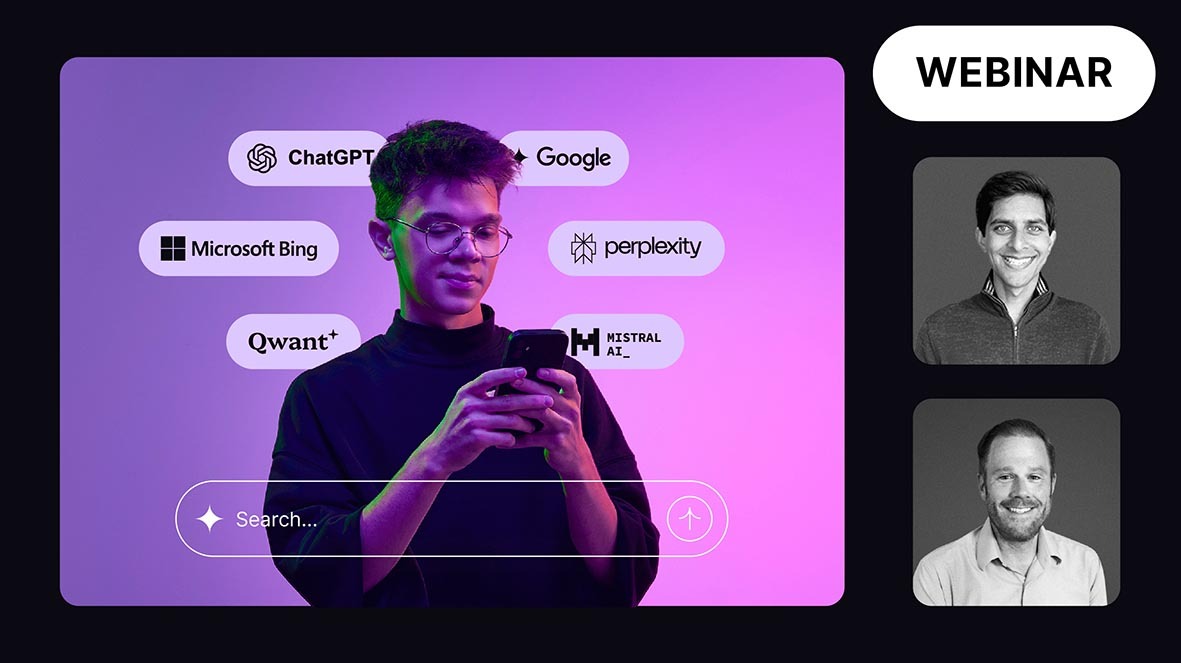Back to learn seo
How Search Generative Experience Impacts Organic Search Strategies

Search serves every digital citizen on the planet, countless times each day, and has done so for decades. But in 2023 everything changed, with the introduction of Google’s Search Generative Experience (SGE).
Integrating advanced Generative-AI into the search user interface, SGE radically redefines how search queries are answered. These developments encourage new ways of interacting with search engines and pose new challenges and opportunities for SEO strategies. In this article, we’ll delve into the nuances of SGE and explore its profound implications for SEO, helping marketers make sense of this new, dynamic and rapidly-changing terrain.
SGE 101
First announced by Google in May 2023 SGE’s experimental interface has changed the face of Google SERPs (search engine results pages), by offering personalized and conversational responses to fully-formed queries. Currently SGE works best for informational searches, such as problem-identification or solution-seeking queries. For example, you might want to diagnose a problem affecting your prize roses and identify the best remedy; or you might enquire whether adding a specific ingredient to a recipe can improve the result. And if you are using Google Labs on a mobile device (the environment where the SGE “experiment” is being conducted) nearly every problem identification or solution seeking search query is automatically answered in the SGE conversational mode. This suggests the principal application of SGE while Google continues to roll out its new solution.
SGE relies on a Large Language Model (LLM) to “make sense” of information it has learned from the internet, currently the PaLM2 model, but in the last week Google announced an even more powerful multi-modal model Gemini that will replace PaLM 2. Google’s LLM is trained on a large dataset, functioning like a transformer neural network to manage both content and searches within the SGE system. More specifically, the transformer network empowers the AI to make inferences and offer suggestions through the results offered. These results promise to save time – they are fully-formed answers, rather than just the list of links that traditionally defined search results pages – and encourage further conversation within the chat environment.
The biggest difference between SGE and a traditional search is that SGE recalls the original query, which enables it to be modified without the user retyping or changing the original search. This in effect makes Google search function more like a chatbot, inviting users to have conversations with the internet the LLM has learned.
For example, if you are interested in learning about polar bears, through an SGE-powered search, additional information such as polar bears’ diets, habitats, and walking speed would be proactively provided without needing to adjust the original query, allowing for multiple seamless pathways to be served, enhancing the overall user journey.
When a user opts for the SGE results, the answers display in conversation mode. Once the results are generated and conversation mode is activated, follow-up results and questions appear on the same page, allowing users to explore a wider range of related content. Another big difference is that some queries won’t require a click to a website anymore, as they can be answered in the SERP (or transacted when it comes to commercial searches).
To be clear, SGE is not a search engine, it’s a conversational snapshot of what the Google engine surfaces from what the LLM has learned. Yet its ability to offer even more relevant, comprehensive, personalized, and engaging content to users has the potential to permanently change the face of SERPs and radically impact how SEO teams approach achieving, ranking and measuring organic visibility going forward.
Is SGE the Future of Search?
SGE is still in its experimental stage, and not yet available globally or in multiple languages (Those who are currently not in Google Labs and who want to see this type of tech in action should check out Perplexity.ai as a great proxy from what is to come that they can use now.)
And yet SGE is one of the most disruptive advancements in modern search technology to date, and is poised to profoundly impact both users’ search experiences and how brands must adapt if they want to be found through search.
How these disruptions will transform organic visibility and SEO strategies is not entirely certain at present, yet it is imperative that SEO teams understand what remains fundamental today, and proactively prepare for what will be essential tomorrow. By embracing the conversational essence of SGE, brands can position themselves for a future in which dynamic content connects with users in real-time, while maintaining an open and agile approach that embraces innovation without neglecting the SEO fundamentals.
Brands still need to keep a firm grip on the SEO strategies they’ve relied on for decades. While SGE streamlines search outcomes to make things easy for users, SEO is still all about making it easy for search engines to find and understand the content those answers surface and serve. Ensuring content integrity, quality, and relevance is still essential for findability, and Google’s EEAT (Experience, Expertise, Authority, Trustworthiness) Guidelines are even more relevant than ever as they attempt to stem the tide (ironically) of AI-generated content. It’s all change for how users experience search, but brands that neglect the fundamentals of findability for completely new tactics are likely to regret this in time. (For more guidance on how SEO teams can navigate this emerging landscape see our FAQs on GenAI and SGE).
Whether SGE announces the future of search will in reality depend on user adoption, market forces and the scalability of the technology. To definitively shape the future these disruptions must add lasting and superior value by providing rapid, relevant and trustworthy answers. In short Google’s “experiment” needs to succeed quickly and be sustainable over the longer term. LLMs demand massive investment and energy resources, and currently undermine the global market leader’s dominant business model.
How search is experienced in the future will ultimately depend on how it will be monetized.
.svg)




.svg)

_Webinar_Banner%201%20(1).png)
.svg)
.svg)

